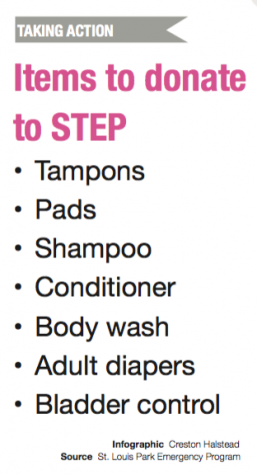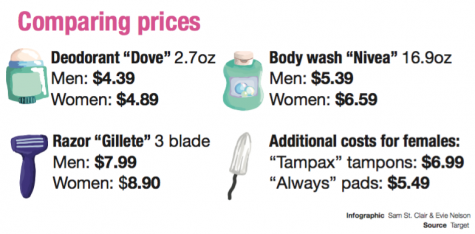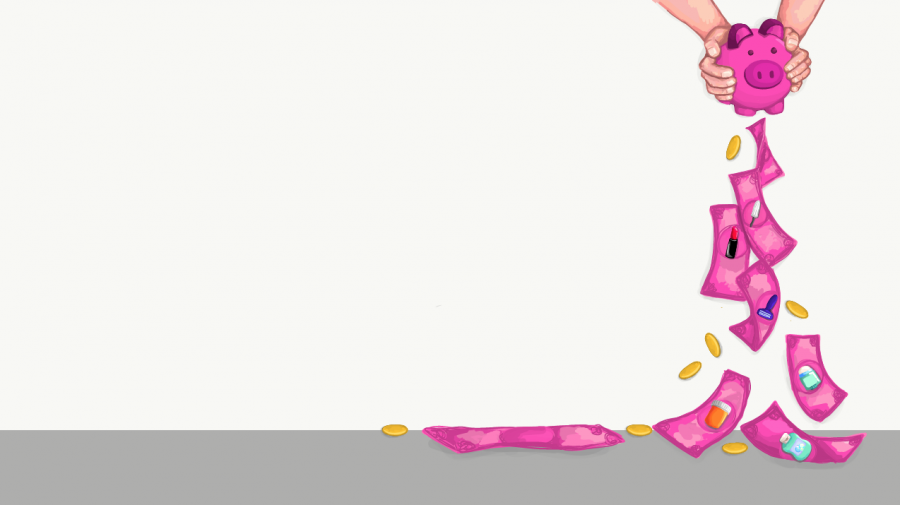What’s at cost for female consumers
Pink tax sets women at a disadvantage
December 4, 2018
According to senior Grace Lynch, students unaware of an underlying issue in the prices of feminine products may be unknowingly spending more money than necessary.
“We all need products like shampoo, conditioner and deodorant, and so just small things like that can add up, especially for high schoolers,” Lynch said.
Understand pink luxuries
Amy Stephenson, head of local Michigan-based organization, Helping Living Period, said she was astonished by the unreasonable prices of essential women’s products and the effect that it has on the female population.
“My friend and I founded (Helping Living Period) three and a half years ago after we read an article in the Huffington Post how homeless women don’t have access to pads and tampons,” Stephenson said. “They resort to using socks and newspaper and unimaginable unhygienic things.”
According to Minnesota Public Radio (MPR), the pink tax is a legitimate tax implemented by the government as well as the term used to describe disproportionate pricing of products marketed toward different genders.
Stephenson said most states apply the pink tax to necessary feminine products.
“(Menstrual products) are still taxed in the majority of states in our country, and it’s not covered under federal programs either, so it’s just expensive,” Stephenson said.
According to MPR, nine states, including Minnesota, have repealed the pink tax from products. The program director of Period, Eira Nylander, said she believes many other states’ and countries’ tax menstrual products because of misogynistic viewpoints.
“Other medications and products such as Viagra, hair loss medication, even chapstick are not (priced fairly). That affects the way people look at menstruation,” Nylander said.
According to Birdfeeder adviser Sophia Ross, the price differences between sexes even apply to children’s toys.
“I’ve seen where there’s a boy’s scooter and a girl’s scooter, exactly the same thing and it says that the girl’s scooter was like $49.99 and the boy’s scooter was $29.99,” Ross said.
According to Nylander, her career has made her realize the lack of knowledge revolving around luxury priced items.
“A lot of people don’t even know that there is a tax of menstrual products. I put so much emphasis on changing cultural norms and social media is a very strong weapon for that,” Nylander said.
Lower income families are affected the most because they are already struggling to pay for other necessities, according to Stephenson. She said they do not have the extra income to pay the tax on pads and tampons.
“When you have a fixed income, this is just one more thing that you have to pay for, that you don’t have the money for,” Stephenson said. “Families have to choose (between) buying products or getting food.”
Stephenson said she believes that despite the causes of the price disparity, feminine hygiene products must be affordable for all women.
“The equity issue covers a lot of different things, but from a pure cost standpoint we don’t have a choice. Like toilet paper, you have to have (menstrual products),” Stephenson said.
Nylander said Period primarily serves homeless menstruators because of the lack of resources available even within shelters.
“(Providing products) is something that a lot of organizations do not bear in mind. Shelters have food, they have clothes, they have different types of services available but they do not have menstrual products,” Nylander said.
Stephenson said there are many financial assistance programs in the United States that do not provide items under the pink tax to those who qualify for the programs.
“Its not covered under WIC, which is Women, Infant and Children. That’s where you can get groceries and things and financial assistance,” Stephenson said. “Even if you qualify (for WIC), you still can’t get free pads and tampons through there, which is kind of ludicrous.”
Pink at Park
Lynch said the extra tax on women’s products is not only unfair, but it creates an endless cycle that is detrimental to women.
“I think it is pretty messed up that companies are targeting gender and who they’re marketing and selling products to,” Lynch said. “Not only do women make less money per dollar than men do, but by making women’s products more expensive, they’re then having to spend more and it is just a continuous cycle that is kind of screwing over women.”
Ross, who is also a business marketing teacher at Park, said the extra cost for women’s products may be because of tariffs on imports.
“Things that we get from other countries are taxed differently and so that’s not anything that we could control. It’s the government’s control on negotiating our tariffs and sometimes certain products for females are taxed more when they come into this country,” Ross said.
 Junior Yoni Potter said he believes the pink tax is an unnecessary and unjust payment inflicted deliberately by the government.
Junior Yoni Potter said he believes the pink tax is an unnecessary and unjust payment inflicted deliberately by the government.
“I think it’s really unfair that in our society, where women get paid less, they’re expected to pay more for products that they need. The government considers them to be a luxury but they’re really necessities,” Potter said.
Nylander said her organization targets primarily local homeless youth and young adults, yet often finds challenges with viewing the end result.
“It is hard to get our numbers and statistics because the only thing we can do really is get those products to shelters. We look at how education and cultural notions of what periods are and it effects the way people look at it,” Nylander said.
Ross said there are different places around the school where students can get hygiene products if they need them, including the Birdfeeder.
“I do know if you go to the nurse’s office, you can always get a free tampon or pad if you need it,” Ross said. “Here at the Birdfeeder, we would be more than happy to help supply those things for students that we’re already serving food with if they need it.”
Rethink pink
When it comes to making these products accessible, head of the music department and choir teacher John Myszkowski said he believes it is a good idea for teachers to provide menstrual products for students.
“I think it kind of takes the stigma away from it. It is natural, most women go through it, and for centuries they have,” Myszkowski said.
Stephenson said she agrees providing these products openly would allow for a discussion and help reduce the stigma around menstrual products.
“The more it is discussed just removes that stigma and makes things more equitable. It removes the shame from it,” Stephenson said.
Nylander said once communities break the taboos concerning the pink tax, we can move forward in providing more knowledge and not being afraid of the issues females face.
“Once you educate kids about anything that definitely breaks that stigma and makes people more comfortable to speak about certain things,” Nylander said.
French teacher Kyle Sweeney said when emphasizing on menstruation products, the restrooms would be a good place to hold them and more convenient than always going to the nurse’s office or a friend.
“It would be a lot easier if there was a basket of various things in the bathroom, I don’t know why we don’t do that, it seems like something (Park) could do,” Sweeney said.
Nylander said Period is making efforts within schools to change the current situation, including starting chapters for those who seek change in attitudes inside their local communities.
“We’re trying to push a lot of policy changes in schools and universities and we have chapters across the nation,” Nylander said.
Stephenson said vending machines stocked with these supplies would be a great solution to encourage students to take action themselves.
“There’s still always people in your school that need the products, no matter where you live. You can make it a fundraising effort to purchase the machine and purchase the products to go in it. That to me would be huge,” Stephenson said.
According to Potter, the pink tax on women’s products should be taken away if in reality they are the same as men’s.
“I think that the extra tax should definitely be taken away and that companies that make products for men and women should make them the same price if they’re really the same product,” Potter said.
Freshman Pema Dolkar is a firm believer in that feminine hygiene should come at no cost at all, that they are simple necessities.
“Pads and tampons should be free in public places, just like they have toilet paper because it’s not something that we can really control and we shouldn’t have to pay just to be hygienic,” Dolkar said.
